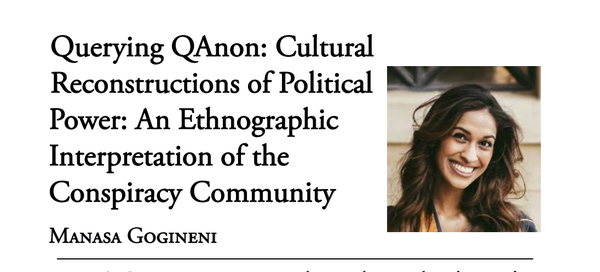
Querying Qanon
For my senior honors thesis, I elected to combine
my academic interests in political science and anthropology with a
research-based ethnography of the QAnon conspiracy phenomenon.
In this excerpt, I explore why people have identií ed with QAnon
between 2017 and 2021 by placing the conspiracy’s current events
and cosmologies in conversation with evergreen theories about how
power manifests in America’s cultural imagination. Drawing upon
landmark and contemporary claims from sociocultural anthropology
and political science, and captured experiences from participants in the
conspiracy community, I speculate that QAnon articulates Americans’
fundamental frustration with their political institutions through its
processes of creative assembly. In other words, QAnon is about time
travel, cannibalism, and child-preying cabals to its proponents—yet
QAnon’s particular imagery and macro-level behavior vocalizes people’s
distrust of the American political system, as the increasingly powerful
mediating forces of globalization, capitalism, and social media amplify
collective expectations for the government while introducing new
avenues for knowledge formulation and political participation. My
í ndings imply that conspiracy communities like QAnon’s, without
certain structural changes in national policy or realignment of
information technologies, will continue to rapidly scale.
my academic interests in political science and anthropology with a
research-based ethnography of the QAnon conspiracy phenomenon.
In this excerpt, I explore why people have identií ed with QAnon
between 2017 and 2021 by placing the conspiracy’s current events
and cosmologies in conversation with evergreen theories about how
power manifests in America’s cultural imagination. Drawing upon
landmark and contemporary claims from sociocultural anthropology
and political science, and captured experiences from participants in the
conspiracy community, I speculate that QAnon articulates Americans’
fundamental frustration with their political institutions through its
processes of creative assembly. In other words, QAnon is about time
travel, cannibalism, and child-preying cabals to its proponents—yet
QAnon’s particular imagery and macro-level behavior vocalizes people’s
distrust of the American political system, as the increasingly powerful
mediating forces of globalization, capitalism, and social media amplify
collective expectations for the government while introducing new
avenues for knowledge formulation and political participation. My
í ndings imply that conspiracy communities like QAnon’s, without
certain structural changes in national policy or realignment of
information technologies, will continue to rapidly scale.
























